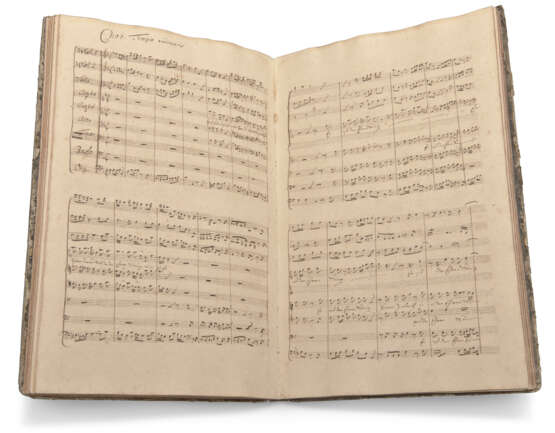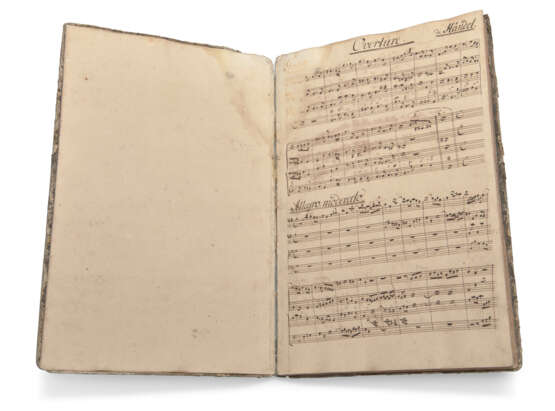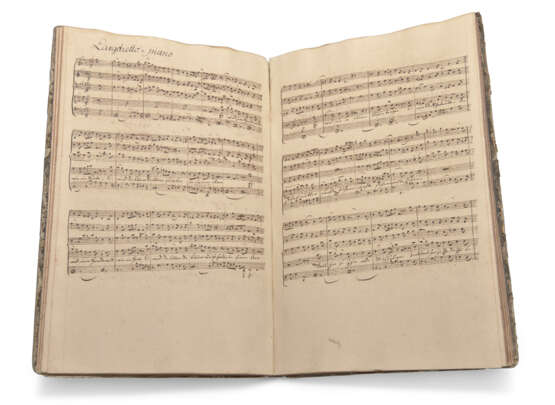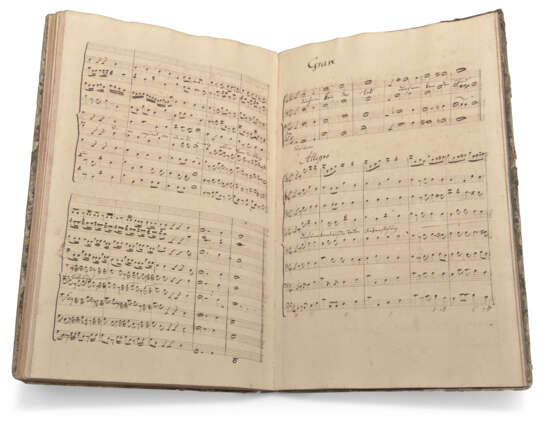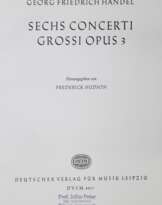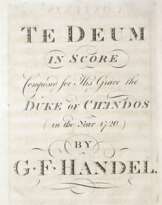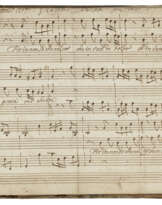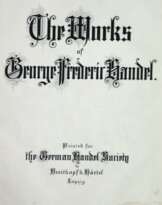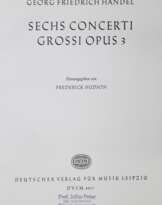ID 1053194
Lot 80 | George Frideric Handel (1685-1759)
Estimate value
£ 8 000 – 12 000
Manuscript of the choruses from the oratorio Messiah, HWV 56, with the libretto in German translation, n.d. [18th century, after 1772]
Handel’s Messiah in an apparently unrecorded German translation; a manuscript presumably prepared for one of the early performances of the oratorio in Germany in the final decades of the 18th century.
Choruses and four movements for soloists notated in full score in dark brown ink on two to three systems of four to ten staves per page. 276 pages, 355 x 225mm, thick paper hand-ruled with 16-19 staves per page, occasionally sloppily ruled, no watermark visible, titled on p.1 (‘Overtüre […] di Händel’), movements marked in Italian, libretto in German throughout in an 18th-century hand, the final seven pages comprising an appendix containing two movements mistakenly omitted during the writing of the manuscript. Contemporary German binding, marbled paper over boards.
Provenance:
(1) Bernard Quaritch; purchased June 2011.
(2) Schøyen Collection, MS 5498.
Michael Arne, son of the composer and Handel contemporary Thomas Augustine Arne, introduced parts of Messiah – with English text – to Germany at a private concert in Hamburg on 15 April 1772. Afterwards it was sung in German in Hamburg, with the Klopstock-Ebeling translation, conducted by Carl Philipp Emanuel Bach in 1775, and at Mannheim under Vogler in 1777. Goethe and Herde discussed and wrote extensively about the oratorio – Herder went so far as to provide his own translation of the libretto into German, which was used in Weimar under Kapellmeister Wilhelm Wolf in 1780 and 1781. Most 18th-century German performances of the Messiah comprised heavily edited versions, either simplified to a selection of arias and choruses or ambitiously re-orchestrated to suit contemporary tastes with added instrumentation. Our manuscript – with the libretto in an 18th-century hand – should be considered in the context of this tradition: the score omits most of the arias and recitatives, apart from two arias (‘He shall feed his flock’/‘Es wird seine Herde weiden’ and ‘Why do the nations rage’/‘Warum toben die Heiden’), one recitative (‘All they that see him’/‘Und die Ihn sehen’) and one duet (‘Oh death!’/‘O Tod’). One of the choruses (‘Lift up your heads’/‘Hoch thut euch auf’) is recorded here in a cut-down form.
| Artist: | George Frideric Handel (1685 - 1759) |
|---|---|
| Place of origin: | England, Germany |
| Auction house category: | Letters, documents and manuscripts |
| Artist: | George Frideric Handel (1685 - 1759) |
|---|---|
| Place of origin: | England, Germany |
| Auction house category: | Letters, documents and manuscripts |
| Address of auction |
CHRISTIE'S 8 King Street, St. James's SW1Y 6QT London United Kingdom | ||||||
|---|---|---|---|---|---|---|---|
| Preview |
| ||||||
| Phone | +44 (0)20 7839 9060 | ||||||
| Buyer Premium | see on Website | ||||||
| Conditions of purchase | Conditions of purchase |
